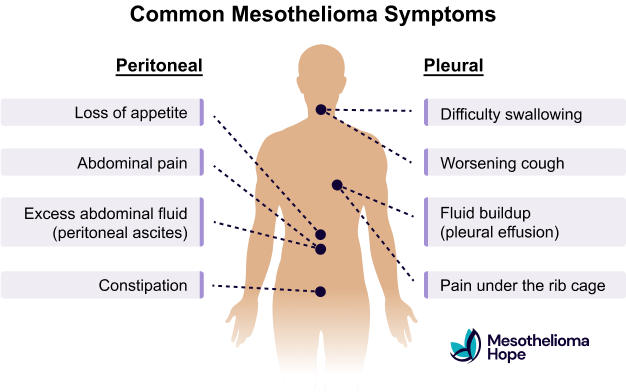What Are the Symptoms of Mesothelioma?
After someone breathes in or swallows asbestos, it can take 10-50 years for mesothelioma symptoms to appear because of how slowly the disease develops.
The symptoms can vary depending on the type of mesothelioma and where it forms in the body.
Symptoms of mesothelioma include:
- Bloating
- Buildup of fluid around the lungs or abdomen (effusion/ascites)
- Chest pain
- Shortness of breath
- Stomach pain
- Weight loss

Mesothelioma symptoms can worsen rapidly and become severe. This is why it’s important to advocate for yourself if you believe something is wrong.

“If you feel like you’re not getting better and this is something new for you, encourage your doctor to proceed with more testing.”
Pleural Mesothelioma Symptoms
Malignant pleural mesothelioma develops in the pleura, the thin lining that protects the lungs.
The most common sign of pleural mesothelioma is pleural effusion, which is fluid buildup in the lung lining. This can make it more difficult to breathe. More than 80% of patients experience pleural effusion, according to a report in Pathology International.
Other symptoms of pleural mesothelioma include:
- Difficulty swallowing
- Fatigue
- Hoarseness
- Lumps under the skin
- Pain under the rib cage
- Weight loss
- Worsening cough
If you’ve noticed any of these mesothelioma signs, our Free Symptoms Checklist can help. Bring it to your next doctor’s visit to get clarity on your health.
Peritoneal Mesothelioma Symptoms
Peritoneal mesothelioma starts in the lining of the abdomen, known as the peritoneum.
Symptoms of peritoneal mesothelioma include:
- Abdominal pain
- Bloating
- Constipation
- Fatigue
- Fluid buildup in the abdomen (peritoneal ascites)
- Loss of appetite
- Nausea and vomiting
- Weight loss


“I was having stomach pains for about a year, some pretty severe pain. It was written off as more like a menstrual or woman’s issue, as it is with a lot of women diagnosed with peritoneal mesothelioma. It was about a year before I finally got the scans I needed.”
Pericardial Mesothelioma Symptoms
Pericardial mesothelioma forms in the protective lining of the heart called the pericardium.
Symptoms of pericardial mesothelioma include:
- Chest pain
- Coughing
- Difficulty breathing
- Fatigue
- Irregular heartbeats and murmurs (arrhythmias)
- Night sweats
- Palpitations
- Tightness in the chest
- Weight loss
Pericardial mesothelioma symptoms can overlap with other heart conditions, so getting a diagnosis may be more challenging. You should see a mesothelioma specialist if you or your loved one are having any of these symptoms and you think you were exposed to asbestos.
Testicular Mesothelioma Symptoms
Testicular mesothelioma cancer develops in the lining of the testes known as the tunica vaginalis.
Symptoms of testicular mesothelioma include:
- Discomfort or pain around the scrotum
- Excess fluid and swelling in one or both testicles (hydrocele)
- Masses on the testicles or in the testicular lining
This type of cancer may spread and cause stomach pain by the time it gets to the advanced stages. Because testicular mesothelioma is so rare, it’s usually discovered by accident during surgery or imaging scans.
On average, it takes 9 months from the start of malignant mesothelioma symptoms to get an official diagnosis.
When Should I See a Doctor for Signs of Mesothelioma?
You should visit a mesothelioma specialist if your symptoms don’t go away or they get worse over time.
A specialist can perform a physical exam and order imaging scans to look for tumors or other abnormalities. They will order a biopsy to check for cancer cells if they think you may have mesothelioma based on your symptoms and scan results.
Getting an accurate diagnosis can help you access the best treatments to ease your symptoms and keep the cancer from spreading to other areas of the body.
Download our Free Symptoms Checklist to discuss with your doctor so they have better insight into what you’re experiencing.
Treatments to Manage Mesothelioma Symptoms
Palliative care isn’t just for end-stage cancer — it can help manage mesothelioma symptoms and improve quality of life at any point in the patient journey.
Palliative treatment options include:
- Pain management: Medications or nerve-blocking procedures can help diminish discomfort caused by tumors or treatment side effects.
- Paracentesis: This procedure relieves the symptoms of ascites by removing excess fluid from your abdominal cavity.
- Pleurectomy with decortication: This surgery can help manage pleural effusions by removing part of the lung lining.
- Pleurodesis: This treatment seals the two layers of the lung lining to prevent pleural effusions.
- Thoracentesis: Doctors use a small needle to remove excess fluid from the thoracic (chest) cavity to help you breathe better.
You can get palliative care alongside standard mesothelioma treatments to help you feel more comfortable.
Contact our nurses to learn more about palliative care and other treatments that can help with your mesothelioma symptoms.
Malignant Mesothelioma Symptoms by Cancer Stage
Malignant mesothelioma symptoms can show up differently depending on what stage of mesothelioma you have. Learn more about common symptoms of early- and late-stage mesothelioma below.
Early-Stage Mesothelioma Signs and Symptoms
Initially, mesothelioma symptoms are mild and can be misdiagnosed as more common illnesses. Some patients may not have any symptoms at all.
Early symptoms of mesothelioma may include:
- Chest or stomach pain
- Fatigue
- General discomfort
- Persistent coughing
- Shortness of breath
- Unexplained weight loss
If you have mesothelioma, it’s better to be diagnosed at an early stage when the cancer is easier to treat. This is why it’s so important to see a specialist immediately after you start feeling sick.


“I was having a hard time breathing, and I thought maybe it was allergies. When I went to urgent care, they said the left lung had collapsed. I was put in the hospital, and there was a biopsy done. Then it came back positive for mesothelioma.”
Late-Stage Mesothelioma Signs and Symptoms
If your cancer has started to spread to the lymph nodes or other internal organs, you may notice new or more severe symptoms.
Symptoms of advanced mesothelioma can include:
- Anemia (lack of healthy red blood cells)
- Blood clots
- Chronic fatigue
- Coughing up blood (hemoptysis)
- Difficulty swallowing
- Excessive sweating
- Loss of appetite
- Muscle atrophy (wasting)
- Severe chest pain
- Shortness of breath (dyspnea)
- Swelling of the face or arms
Get our Free Mesothelioma Guide to take the first step toward better understanding this cancer, its symptoms, and your options for treatment.
Get Help Diagnosing Your Mesothelioma Symptoms
You should see a mesothelioma specialist as soon as possible if you think you may be experiencing symptoms of mesothelioma — even if you’re not sure whether you’ve been exposed to asbestos.
Not sure where to start? Mesothelioma Hope can recommend local specialists so you can get a timely and accurate diagnosis.
We can also help you:
- Explore ways to manage your symptoms
- Prepare a list of questions to ask your doctor
- Learn more about different treatments
- Pursue compensation after a mesothelioma diagnosis
Call (866) 608-8933 or fill out our contact form to get started.
Malignant Mesothelioma Symptoms FAQs
What are the signs and symptoms of mesothelioma?
Mesothelioma symptoms and signs commonly include:
- Chest pain
- Difficulty swallowing
- Fever
- Night sweats
- Persistent cough
- Shortness of breath
- Unexplained weight loss
Other potential signs of asbestos cancer include difficulty swallowing, fever, night sweats, and tiredness. These symptoms can also be caused by other conditions, so it’s important to see a mesothelioma specialist for a proper diagnosis.
What are the early warning signs of mesothelioma?
Early signs of pleural mesothelioma include:
- Chest pain
- Persistent cough
- Shortness of breath
These early symptoms of mesothelioma can be easy to miss because they can overlap with less serious illnesses.
Early signs of peritoneal mesothelioma include:
- Bloating
- Changes in appetite
- Stomach pain
See a doctor if these symptoms don’t go away or get worse, especially if you have a history of asbestos exposure. Mesothelioma can take decades to appear, so many people don’t realize their symptoms are related.
How can you recognize the symptoms of mesothelioma progression?
Shortness of breath may increase and make it harder for you to complete everyday tasks.
If you have chest pain, it may intensify and happen more often. Coughing may become more persistent and may start to produce blood.
Other signs of mesothelioma progression include:
- Extreme fatigue
- Fluid buildup around the lungs or abdomen
- Significant weight loss
These symptoms usually mean that the cancer has advanced and requires more aggressive treatment.
What are the symptoms of mesothelioma in the abdomen?
One of the main symptoms of mesothelioma in the abdomen, also called peritoneal mesothelioma, is a buildup of fluid in the abdomen called ascites. It can make the stomach look and feel full.
Other signs can include:
- Bloating
- Feeling full quickly
- Loss of appetite
- Stomach pain
- Unexplained weight loss
Some people may also notice changes in their bowel habits, such as diarrhea or constipation.
What are the mesothelioma symptoms near death?
Mesothelioma end-of-life symptoms can include:
- Difficulty breathing
- Extreme fatigue
- Severe pain in the chest or abdomen
- Significant weight loss
Some people start to feel confused, drowsy, or less alert as the body begins to shut down. Palliative care can help keep mesothelioma patients comfortable during this time.





